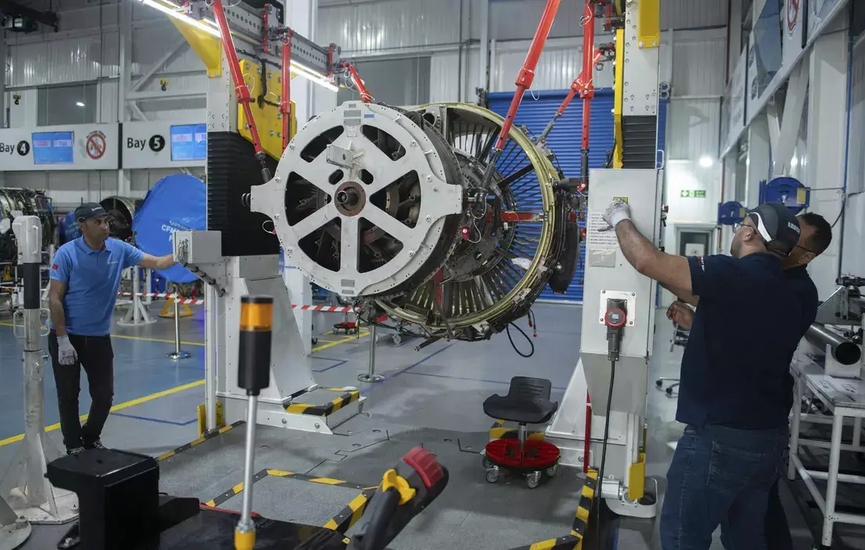Rabat – Morocco is set to strengthen its aerospace industry with plans to produce its first aircraft engine by 2027 or 2028, marking a major step forward for the country.
Minister of Industry Ryad Mezzour spoke with Bloomberg on Thursday, highlighting that the push to develop the aerospace sector is driven by King Mohammed VI’s vision and the country’s sustained efforts to maintain financial stability and control inflation.
“It’s a vision aimed at equipping young people with skills, training, and solid engineering education, alongside investing in renewable energy,” Mezzour explained. These factors, he noted, are key in making Morocco stand out globally.
Aerospace Ambitions and Youth Involvement
By 2027 or 2028, Morocco plans to produce its first aircraft engine and reach full production capacity by 2030, positioning the country among the top five worldwide capable of manufacturing engines of this caliber.
Mezzour likened this achievement to “reaching the semifinals of the World Cup in manufacturing,” underscoring its significance.
Earlier this month, King Mohammed VI inaugurated the Safran aircraft engine industrial complex in Nouaceur, Casablanca. This facility will house two key units: one for the assembly and testing of Safran aircraft engines.
The aerospace sector has become a major contributor to Morocco’s export revenues, reaching over $2.54 billion in 2024. The sector continues to attract top global companies, with over 150 firms now operating in the country. Morocco offers strong incentives for businesses, including a 0% corporate tax for the first five years, followed by around 8% for the next two decades, along with VAT exemptions, duty-free equipment imports, and subsidized land and utilities.
Addressing Youth Concerns and Protests
Mezzour also addressed recent youth-led protests and frustration over the country’s perceived focus on investments for the World Cup rather than sectors like healthcare and education.
Morocco’s youth, he said, “brought us pride,” particularly referencing the Atlas Lions’ historic World Cup achievement.
“We are celebrating them and very proud of them. Our response is to bring them into the political space, ease their participation in elections and public debates, and provide financial support — up to 75% of campaign expenses — to help them run for office and propose ideas,” Mezzour elaborated.
He also mentioned the upcoming finance bill, which allocates a significant budget of $14 billion for education and healthcare.
Growth in the Manufacturing Sector
On Morocco’s manufacturing industry, Mezzour revealed that the sector employs around one million Moroccans, with plans to add another 500 jobs and further attract investment. “We have a plan, we are executing it, and we have trusted partners investing more and more in Morocco,” he said.
Morocco continues to maintain flexible partnerships with reliable global partners, including China and the United States. “Morocco is working with everyone. China is a good partner. America is a good partner. Reliable partners are those who trust Morocco as a global hub and create jobs here,” Mezzour said.
Boom in the Automotive Industry
Beyond aerospace, Morocco is also solidifying its regional and international position in the booming automotive sector. The country currently produces over one million cars annually and is on track to increase its capacity to 1.45 million, with an eventual goal of reaching two million cars.
“We are building a complete electric vehicle battery value chain, attracting investors to produce batteries for over one million cars,” Mezzour proudly shared.
Morocco is also attracting investment in hydrogen and aerospace technologies, with the country positioning itself as a key player in the region. “We will be the only solution outside of China in the region capable of producing the entire battery value chain – from raw materials to finished cars,” Mezzour said. The country is already producing electric vehicles (EVs) and building a large EV battery factory.
Morocco aims to increase its EV production capacity by 53%, targeting the production of 107,000 EVs by the end of 2025.
From 2014 to 2018, the automotive sector created 116,000 jobs, making Morocco Africa’s leading automotive manufacturer. By 2019, over 220,000 jobs had been integrated into the sector, with 250 companies involved in the industry.
